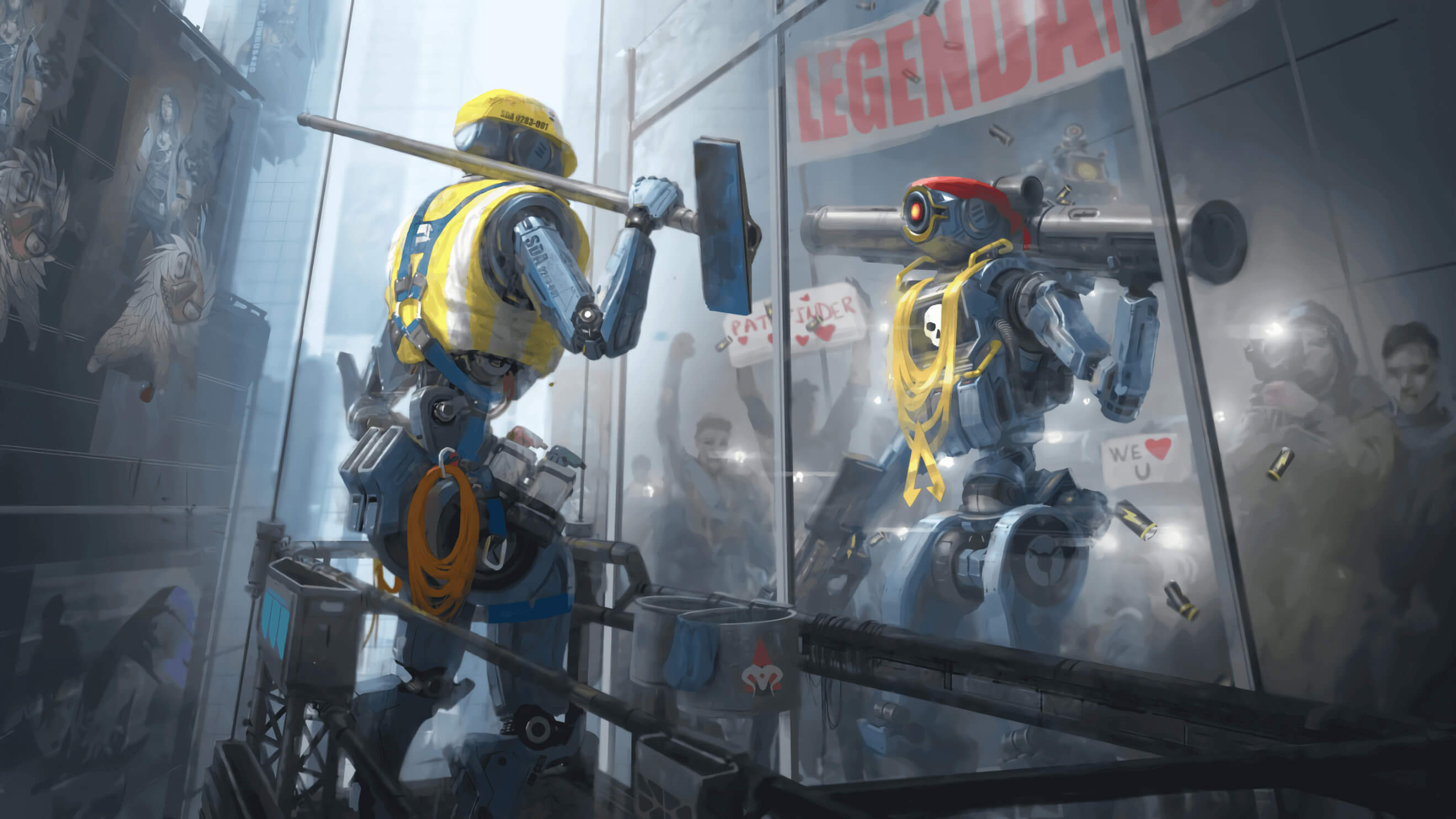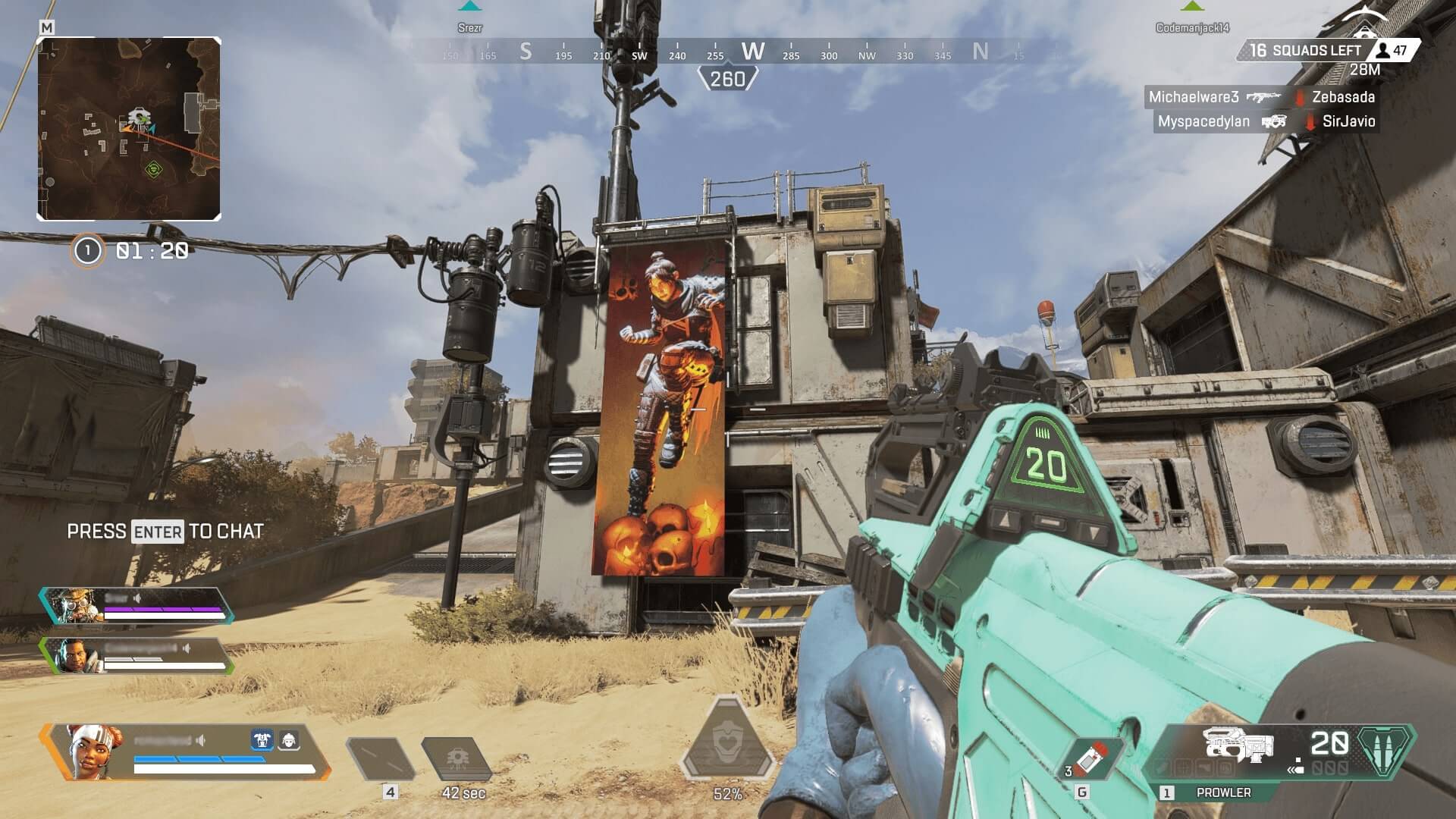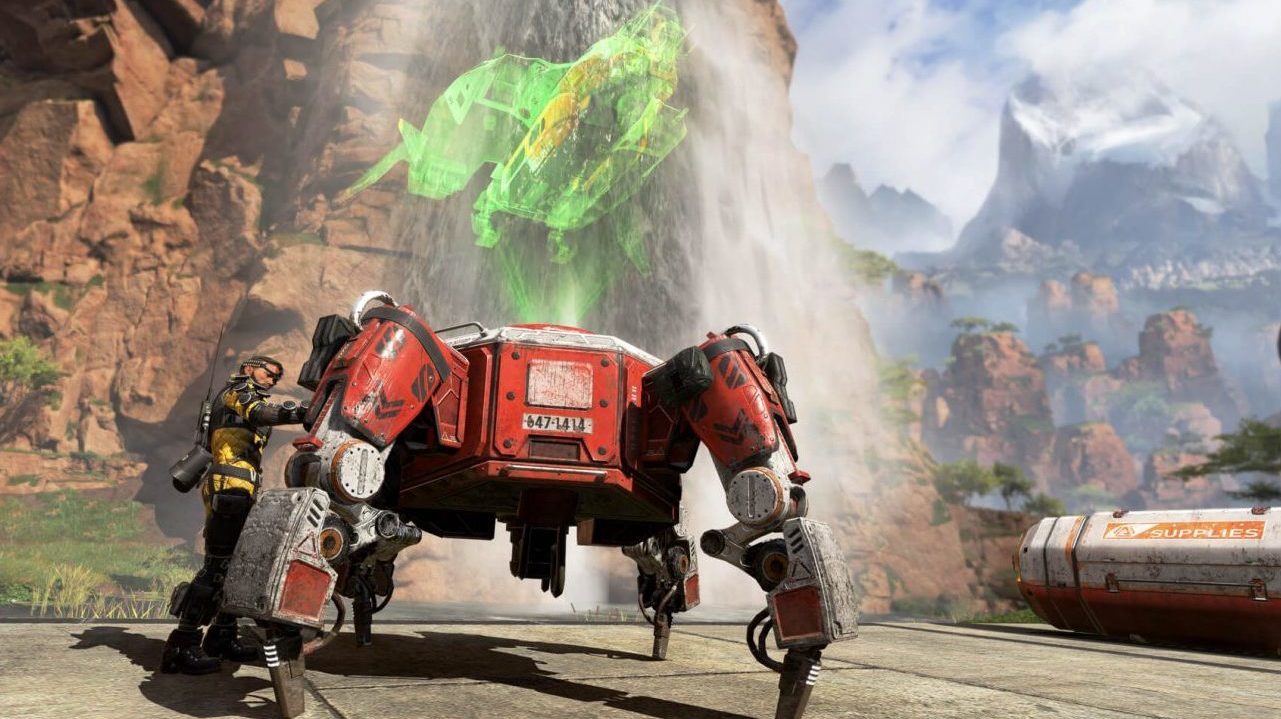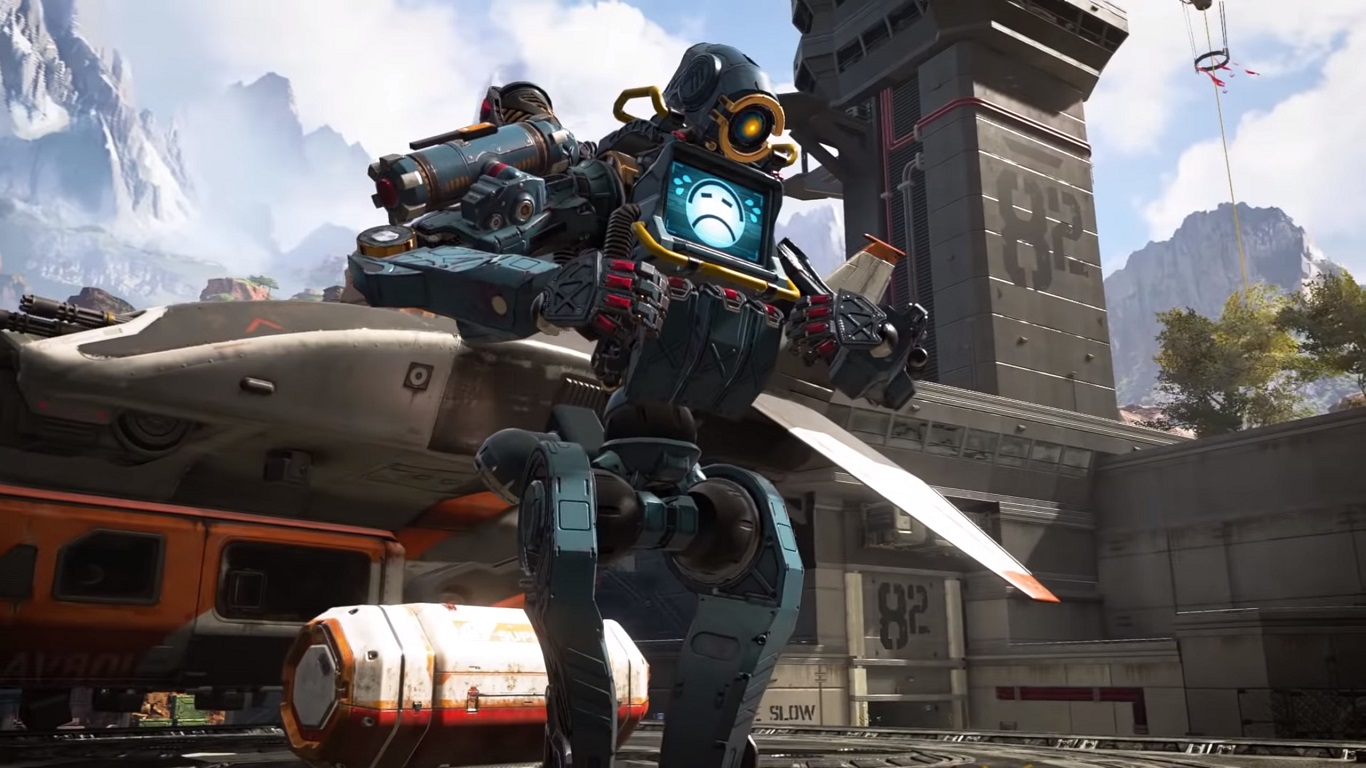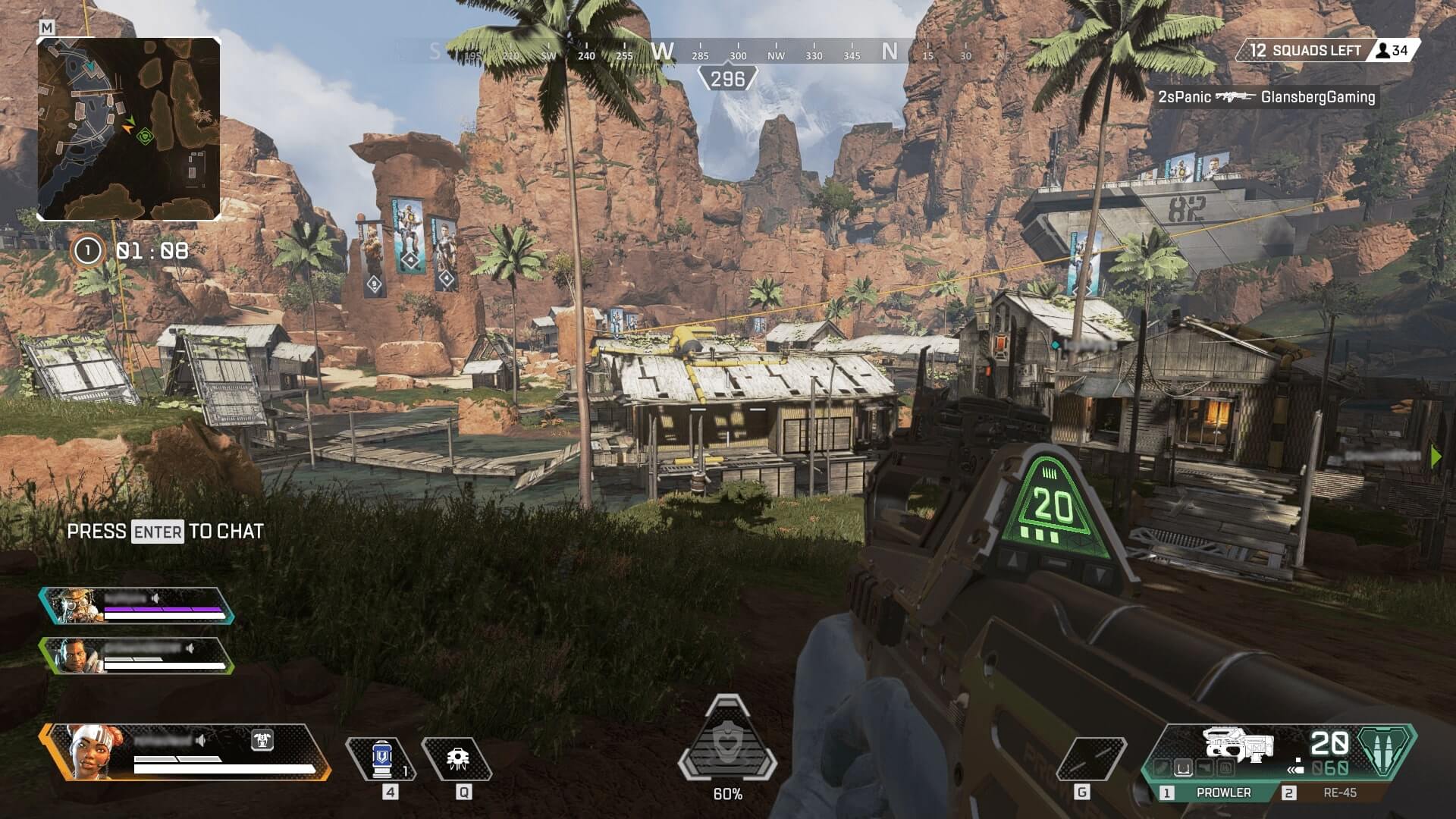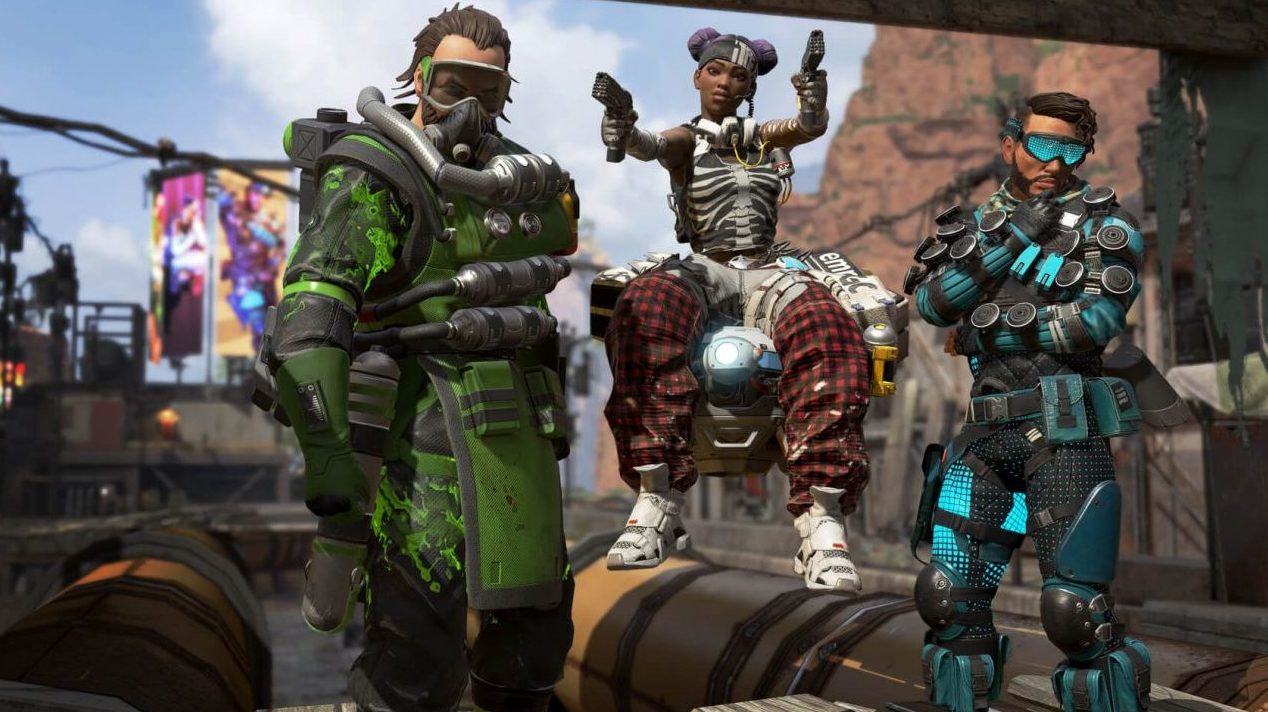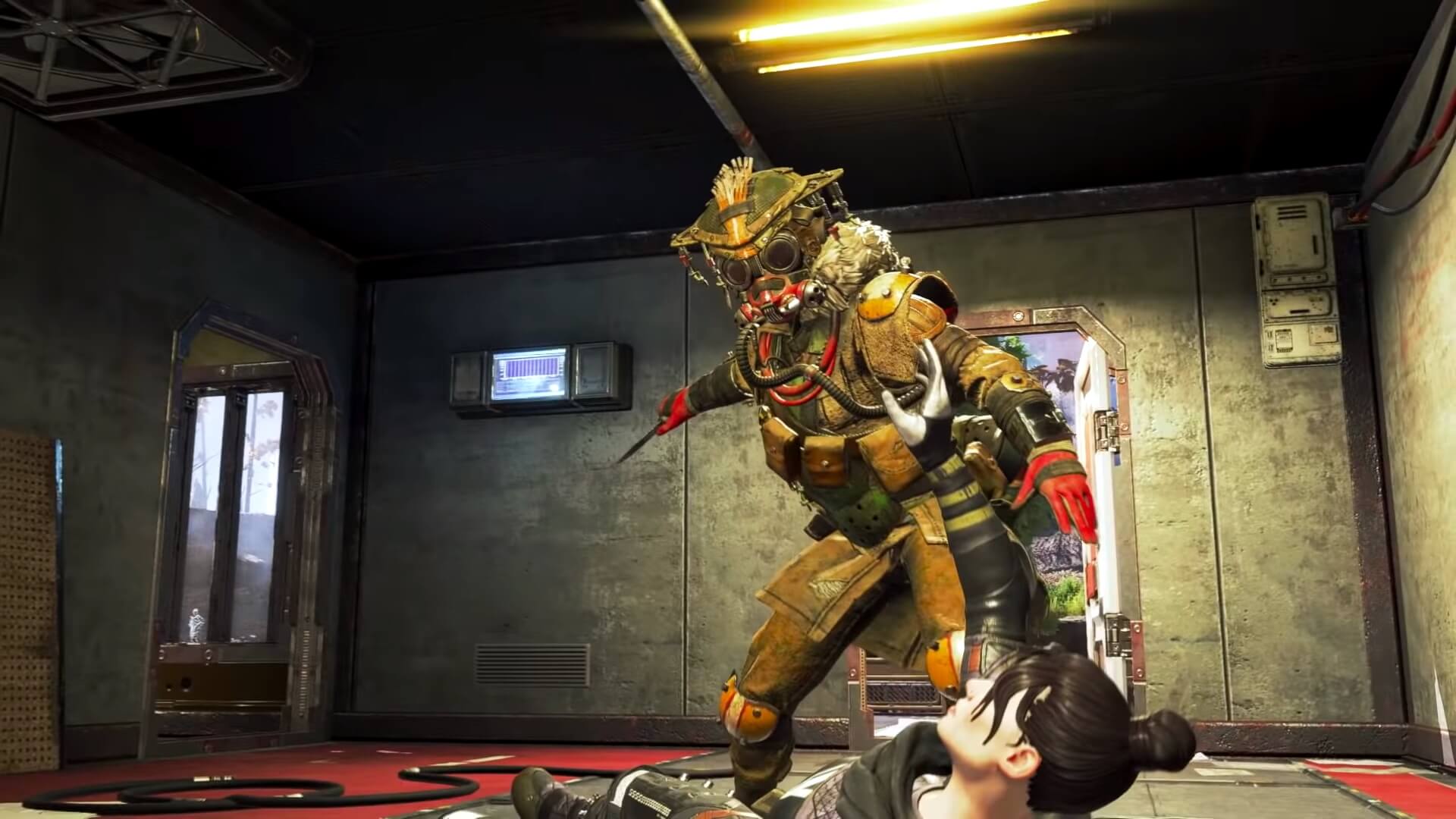 I don't try to be the best in battle royale games. I don't troll or anything, but I'm not as concerned with skillful wins as I am with having fun or coming away with an exciting story. But Apex Legends makes me want to try. I also get some great stories in the process.
I don't try to be the best in battle royale games. I don't troll or anything, but I'm not as concerned with skillful wins as I am with having fun or coming away with an exciting story. But Apex Legends makes me want to try. I also get some great stories in the process.
Apex Legends is a battle royale from Titanfall developer Respawn. It's loosely related to that series' world, but the connections aren't all that important. Twenty teams of three heroes, known as Legends, face off on a map. Each Legend has different abilities---healing drones, air strikes, shielding domes---that can give your team an advantage in battle. The hero aspect of the game is a change for battle royales, but other than that, the basics of Apex Legends are standard for the genre: scooping up weapons and attachments, outracing an encroaching circle, and murdering your way to the last team standing.
Apex is a tasting menu of battle royale moments, rather than the potato chip jump-die-restart of my Fortnite experiences. There are countless moments to surprise or disappoint yourself. If I don't die immediately upon landing on the game's map, failing to find a gun before someone else does, I tend to last until well into the endgame, surviving multiple brushes with death before I'm downed.
The game's Legends are compelling to choose between, but they lack the personality of Overwatch's characters or the visual flair of Fortnite's myriad skins. You can customize them to an extent, giving them different voice lines and outfits, but I've yet to find any combination of customizations that makes even my favorite Legend, the healer Lifeline, feel like mine. Instead of being defined by who they are or how fans can customize them, Legends are defined by what they do.
Do you want to be hyper-mobile? Choose Pathfinder for his ziplines or Wraith for her portals. Like using your environment? Deploy Bangalore's smoke launcher or Caustic's gas traps. Prefer to use stealth and trickery? Try Bloodhound's tracking abilities or Mirage's decoys. Legends are bodies rather than characters, but those bodies are compelling to inhabit.
Unlike the cartoon clumsiness of Fortnite or the technical crawl of PUBG, Apex characters' movement feels balletic. They can run quickly, slide down hills, and mantle seamlessly up high walls and over obstacles. There's no fall damage, and it's dizzying and thrilling to leap from impossible heights and keep moving. The game's map feels built for athletic joy, with balloons to rappel up to and dive from into towns designed for shifting from low to high ground. You can cross swathes of the map at a clip, move in and out of fights fluidly, and reposition yourself like a ninja to get that final shot off.
The capable, creative bodies Apex gives me inspire me to live up to them with my tactics. I take risks I don't take in other battle royales. I weave through an explosive airstrike to rescue a teammate. I slide down long hallways to escape danger. I leap from a cliff to surprise an enemy team below. At this point, even just walking around the game makes me feel like a badass.
The actual shooting, in contrast, feels less freeing. Aim drifts, guns recoil wildly, and your magazine is laughably small. You need to find the right attachments and add-ons to counteract weapons' natural tendency to rebel. Even with the perfect load-out, you can find yourself firing frantically in a fight while barely doing damage. The contrast---how wonderful and skillful it feels to simply move in the game, versus the attention and control necessary to actually succeed in combat---has sent me down YouTube videos and Reddit threads, back to the game's brief tutorial to test weapons and study bullet spray, to the wall by my computer with tape and printouts of weapon rankings and attachment lists.
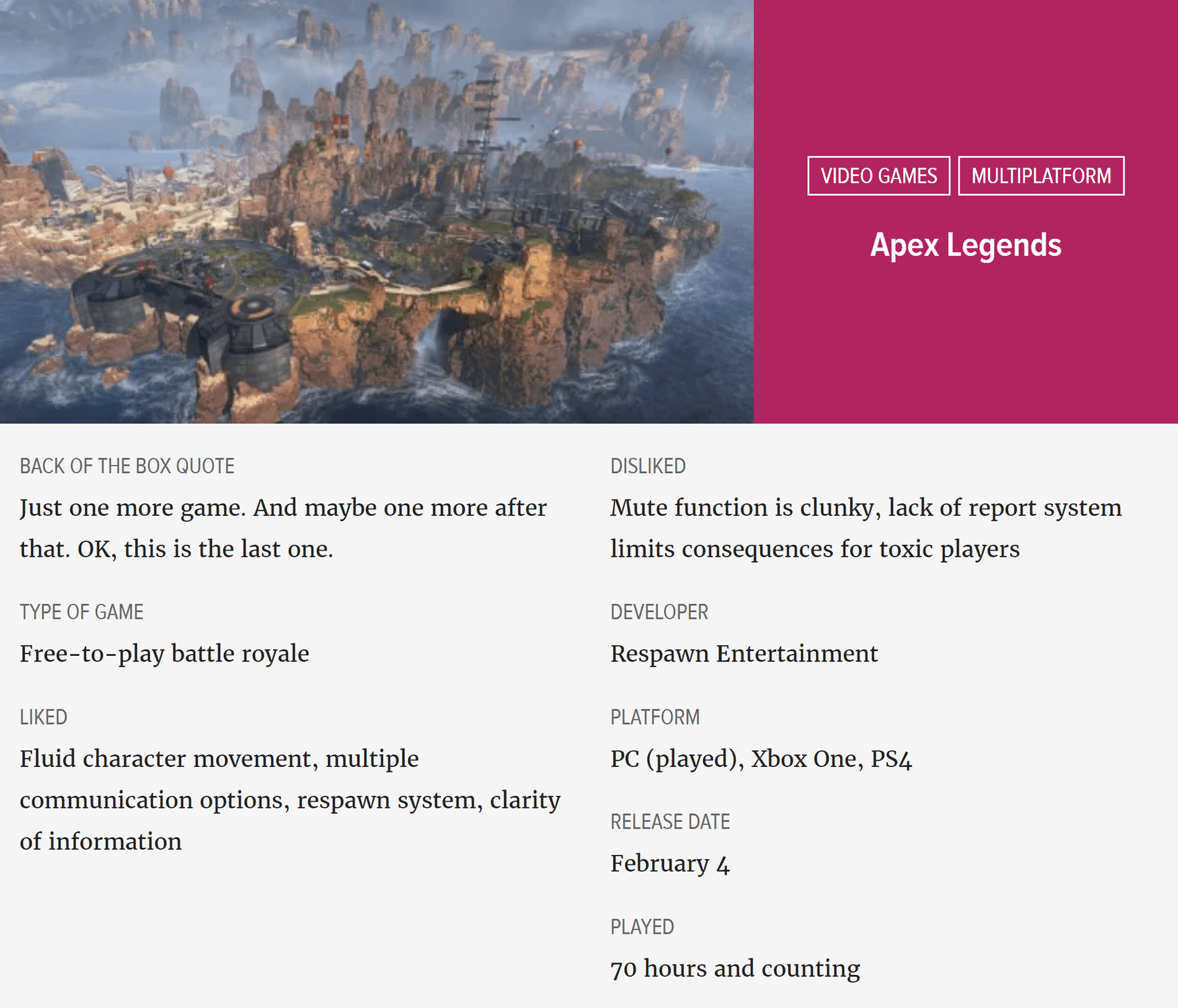
As if in concession to its unpredictable weapons, Apex Legends is forgiving in other ways. You find armor and helmets of different rarities, from common white to purple epic to the legendary gold shield that can let you self-revive if you're downed. Additional health kits and shield recharges let you top yourself up mid-fight. As a result, Legends are hardy. Friends I've played with have remarked on how many hits we can take or dish out without dying or felling an opponent. I can fall and be revived, down an enemy only to have them down me minutes later. My team can be outgunned and sent packing, then demolish the next enemy squad we face, then find ourselves outmatched yet again by the next one.
In Apex, down isn't out. Like other battle royales, you have a certain amount of time after being downed during which you can still be revived. Once you've officially died, your teammates have even more time to grab your "banner," a customizable tablet representing your character, and take it to one of the map's respawn beacons. From there, you can be brought back to life, sans your gear, and stay in the game.
You have to calculate the risks of this system. Is the enemy leaving your downed teammate alive as bait? Are they going to camp the respawn beacon and catch you then? This tension creates some memorable scenarios. Once, I raced back into the circle to scoop up my friend's banner the second before it expired and took them out of the game for good. Another time, I weaved through bullets like Neo from The Matrix to snap up both my teammates' banners as two other teams fought over their loot.
The respawn system also inspires loyalty, especially in a game where you're unlikely to last long as a lone wolf. In most of my matches, a teammate has resurrected me instead of leaving me to die. Once, after fetching my banner, a teammate said to me over voice chat, "Don't worry, I won't loot your stuff." When I laughingly asked why, they responded, "Ethics, man." I was able to respawn and recover my hard-earned gear.
Apex Legends encourages this intimacy, both because you need your teammates and because they have so many ways of talking to you. Apex Legends has voice chat, as well as a ping system, which lets you communicate by placing markers instead of talking. Success in all battle royales hinges on team communication, and Apex Legends makes it easy to find a way to talk that you feel comfortable with. With a click of my mouse I can indicate enemies' locations, loot, where I want to go, what gear I need. I have voice communication muted in Overwatch and Fortnite, but not in Apex Legends. In part this is because there's no non-clunky option to mute others, which, along with a current lack of in-game report feature, means it can be hard to avoid toxic players. On the other hand, I don't often need to mute voice chat because relatively few Apex players bother to use it. There are many easy ways to communicate non-verbally, which might be why, in my experience, only the friendliest or most aggressive players seem to get on chat.
This intimacy is bolstered by a startling amount of transparency between players about their desires and in-game choices. At the start of a match, you have a limited amount of time to choose a character; by hovering over their icon, you can indicate who you want to pick, which your teammates can either respect or override. Once you select, you're shown your teammates' rank and their stats, indicated by customizable trackers revealing damage dealt, kills, revives, or character-specific successes, such as kills while in tracker Bloodhound's "Beast of the Hunt" ultimate ability or healing you've done with Lifeline's tactical drone. You also see the match's "champion," a high-ranking player; taking them out will earn you extra experience.
Banners can give you insight into how good another player is or what their gameplay priorities are. Trackers and their unlocks are character specific, so they don't necessarily paint a full picture of a given player's skill, but it's still much more information than other battle royales I've played have shown me about the people responsible for my in-game life. Sometimes, seeing the skill gap between random teammates and myself can feel like a lot of pressure, which either inspires me to try my best or sends me into a spiral of anxiety (or both, in turns).
In a recent match, a lower-level player and I were teamed up with a highly ranked player who had hundreds of kills. Over the game's text chat, the higher-ranking player told us we had "fuck boi stats" and disconnected. This encounter heralded a night of toxic match after toxic match, with other teammates criticizing my character pick and my stats, swearing at me when I made a mistake, refusing to recover my banner, or disconnecting from the match the moment they died instead of giving me a chance to respawn them. Sometimes, other players' nastiness makes me choke; I'll do worse when I hear teammates berate me for every whiffed shot or less-than-ideal choice of landing spot. Other times, this pressure makes me try harder, feeling a need to prove myself. Once, when my teammate with hundreds of kills got downed, I swooped in to finish off their attacker and revive them; their praise in that moment meant more to me than I ever expected, even though it was really just a stranger typing "thanks."
I've experienced this pressure from the other side, too. When I'm teamed with newer players, I feel a sense of protectiveness and, also, a need to rise to the occasion and be an infinitely better player than I am. Recently, I found myself in a match with two new players, who both revealed themselves to be seemingly minors when they started using voicechat. They marvelled over my paltry number of kills and asked me how I was "so good at the game." They even asked if I was superstar streamer Ninja, despite my clearly non-Ninja Origin handle.
I held back on responding for a while, feeling weird about being an adult man playing with two kids. But their questions were so energetic and open---What's armor? Why does that lady keep mentioning a ring? My mouse wheel is broken, what should I do?---that I finally hopped onto voice to explain the game. I made sure to be hyper-conscious of my language, drawing on my experience as a teacher from over a decade ago. Armor lets you take more damage, I told them. The ring is that glowing orange wall and we should avoid it, but it won't kill us right away. You can press the number keys.
While looting, one of them fired a full clip into the air for no reason. I leapt into protective mode, scanning the horizon with my sniper rifle and urging them to get into cover in case anyone heard us. I felt a fierce loyalty to them as we looted our way across the map, calling out what I found and then explaining to them why they might want it. Through a good choice of landing spot, we actually made it into the final three teams, even as I kept having to explain why they should run away from the ring instead of into it.
When gunfire sounded nearby, my heart leapt into my throat. I urged them to hang back as I scouted up ahead, feeling the full weight of their first experience of the game upon me. When they started shooting despite my advice---kids these days!---I leapt into action. I ziplined across a ravine and slid into cover to the enemies' flank, then popped out and drew fire. I danced between buildings and pinged enemies, attracting as much attention as I could. Eventually I was downed, and they both died seconds later. I turned the game off immediately, feeling way more intense emotions than I expected or even necessarily wanted from a quick turn through a battle royale. But it was also a better match than I had ever played before: riskier, more tactical, more meaningful. For that one match, Apex Legends brought out my best.
In a recent chat with some of my Kotaku colleagues about battle royales, I said that the community of a game is what will make me stick with or leave it. As Apex Legends finds its footing, its community could become anything. According to Respawn's roadmap, the game will see seasons and a battle pass, which could mean new cosmetics, loot, weapons, and characters. The game will change, and its community will change with it. Two months from now, it could be the same serious landscape of Call of Duty or the same after-school playground of Fortnite.
Right now, there's a lot of plurality in the Apex Legends community. It has its assholes and its heroes. Anything could happen. All I know is, the game asks for my best. And as it becomes itself, I want to live up to wherever it's going.
